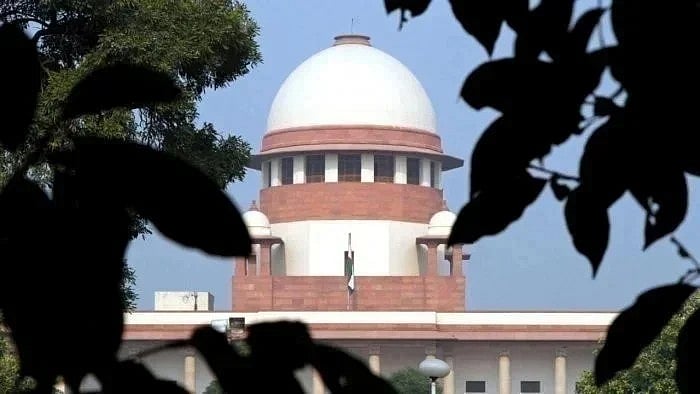
The Supreme Court of India.
Credit: PTI File Photo
New Delhi: The Supreme Court has said the right to equal access to justice is an essential facet of the rule of law, and no person – whether a sitting MLA or an ordinary citizen – can be subjected to procedural disadvantage or preferential treatment without express legal justification.
A bench of Justices J B Pardiwala and R Mahadevan quashed a trial court's order for segregation of trial of Mammam Khan, a Congress MLA from Haryana, in cases connected to the 2023 Nuh violence.
The court stressed expeditious disposal of cases involving legislators is undoubtedly desirable but such administrative prioritisation cannot override the procedural safeguards guaranteed under the Criminal Procedure Code or the constitutional mandate of equality.
Allowing his appeal against the Punjab and Haryana HC's order upholding the trial court's decision, the bench said, a fair trial formed part of the guarantee under Article 21 of the Constitution.
"Departure from established legal procedure – particularly without hearing the affected party – constitutes a serious constitutional infraction," Justice Mahadevan wrote for bench in the 22-page judgment on September 12, 2025.
The court said the segregation order passed suo motu by the trial court even without a notice to the appellant fell short of the constitutional and statutory requirements.
"A unilateral order for a separate charge sheet and segregated trial, passed without notice or application, violates the basic principles of procedural fairness inherent in Article 21,'' the bench said.
Finding the trial court's reliance on the SC judgment in Ashwini Kumar Upadhyay case (2024) as misplaced, the court held the appellant’s mere status as a sitting MLA cannot, by itself, justify a separate trial.
"All accused stand equal before the law, and preferential segregation militates against the equality principle enshrined in Article 14. While the right to speedy trial is an essential facet of Article 21, it cannot be secured at the cost of fairness," the bench said.
The court highlighted Ashwini Kumar Upadhyay judgment emphasised expedition, but it nowhere intended that such expedition be achieved by compromising the fundamental rights of the accused.
The bench also held the trial court exceeded its jurisdiction in directing the police to file a separate charge-sheet against the appellant.
"The discretion to file a charge-sheet lies solely with the investigating agency. Even where multiple charge-sheets are filed, if the offences arise out of the same transaction, they must be tried together,'' the bench said.
The court also pointed out, the only ground recorded for segregation of the trial was the delay occasioned by the non-appearance of certain co-accused. The proper course in such a situation would have been to segregate the absconding or defaulting accused, not the appellant who was regularly before the court, it said.
"By doing so, the trial court inverted the settled principle and thereby committed a manifest error. No finding was recorded that a joint trial would delay proceedings or cause prejudice to the appellant,'' the bench said.
The Haryana government sought to defend the trial court's order saying that separate charge sheets have already been filed, charges framed and evidence was being recorded.
The court, however, said mere progress of proceedings cannot cure the inherent illegality in the manner in which segregation was ordered.
"Procedural fairness and statutory compliance cannot be sacrificed for administrative convenience or retrospective justification. Expediency must operate within the bounds of fairness,'' it said.
The bench underscored the foundational constitutional principle enshrined in Article 14 of the Constitution guaranteed that all persons are equal before the law and entitled to equal protection of the laws.
"This principle extends beyond mere formal equality and requires that legal procedures be applied fairly and uniformly, irrespective of an individual’s public position or status," the court said.
The bench ordered the trial court to conduct a joint trial of the appellant along with the co-accused, in accordance with law.
The MLA from Ferozepur Jhirka constituency in Haryana was named as one of the accused in two FIRs lodged on August 01, 2023 for the offences of rioting, dacoity, mischief by fire, and criminal intimidation in connection with large-scale communal violence that took place in the Nuh District on July 31, 2023.
The court also relied upon Nasib Singh Vs State (2021), which stated separate trial is the rule under Section 218 CrPC, a joint trial may be permissible where the offences form part of the same transaction or the conditions in Sections 219 – 223 CrPC are satisfied, but even then it is a matter of judicial discretion.
The state counsel contended the segregation of the appellant’s trial was necessitated to ensure judicial efficiency, as the presence of 43 accused in one case and 28 accused in another had rendered the conduct of a joint trial logistically and procedurally cumbersome.
